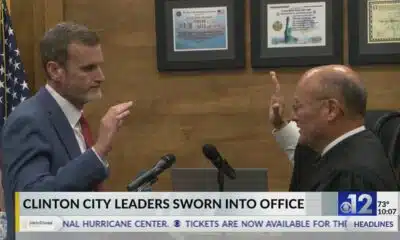Mississippi Today
What to know about gender-affirming care in Mississippi
What to know about gender-affirming care in Mississippi
Mississippi lawmakers are considering a bill that would ban gender-affirming care for trans kids this session, sparking fear among LGBTQ+ Mississippians and their families and allies.
House Bill 11125, also known as the “Regulate Experimental Adolescent Procedures” (REAP) Act, would prevent Mississippi’s roughly 2,400 trans kids and their families from getting hormone therapy or puberty blockers in the state. Lawmakers, contradicting the recommendations of every major medical association in the U.S., have likened gender-affirming care to child abuse and say the bill will protect children.
Trans Mississippians and their allies have said the bill is part of a coordinated attack on their rights. The bill comes two years after lawmakers banned trans athletes from competing on sports teams that align with their gender identity.
As the bill moves through the legislative process, Mississippi Today compiled answers to some commonly asked questions about HB 1125 and gender-affirming care.
What is gender-affirming care?
Gender-affirming care refers to a broad range of interventions, from medical treatment to psychological and social support, that aims to affirm an individual’s gender identity, especially when it is different from the one they were assigned at birth, according to the World Health Organization. It seeks to reduce gender dysphoria, the distress trans people can experience when their physical features do not match their gender identity. The Transgender Care Navigation Program at the University of California, San Francisco, says gender-affirming care can range from “coming out” to friends and family, using different pronouns and changing one’s hairstyle, clothing to going on puberty blockers, hormone therapy or surgery.
Puberty blockers are a type of medication that prevents sex organs from producing estrogen or testosterone. They are reversible and have been used for decades for precocious puberty, the development of secondary sex characteristics at a young age, in cisgender kids. Hormone therapy – the prescription of estrogen or testosterone – typically starts at 16-years-old for trans kids.
For trans kids, who must have parental consent, the goal of gender-affirming care is often to give them time to determine if they want to go through puberty corresponding to the sex they were assigned at birth or if they want to transition, said Lee Pace, a nurse practitioner and co-owner of Spectrum: The Other Clinic, the only transgender medical clinic in Mississippi.
Gender-affirming care is recommended by every major medical association in the United States. It is also evidenced-based and, contrary to the title of HB 1125, not considered “experimental” by the medical community.
In a blog post on the American Medical Association’s website, the president, Jack Resneck, wrote that, “studies have consistently demonstrated that providing gender-affirming care that is both age-appropriate and evidence-based leads to improved mental health outcomes. Conversely, denying such care is linked to a greater incidence of anxiety, depression and self-harm.”
Nationally, trans youth attempt suicide at a rate more than four times their cisgender peers due to social stigma and discrimination. Research has repeatedly shown that gender-affirming care significantly boosts the chances that trans kids will live to see adulthood. A study published last year in the peer-reviewed Journal of the American Medical Association found that over the course of a year, gender-affirming care was associated with 60% reduced odds of moderate to severe depression and 73% less odds of suicidal thoughts.
Are trans youth undergoing gender-confirmation surgery in Mississippi?
No. On the House floor, Rep. Nick Bain, R-Corinth, could not name a single instance of a trans kid undergoing gender-confirmation surgery in Mississippi.
There is no medical clinic in Mississippi that offers gender-confirmation surgery to trans kids, according to Pace and other advocates for the state’s trans community. In general, surgery is not recommended for trans kids by medical organizations that support other forms of gender-affirming care for youth.
No clinic in Mississippi provides what’s commonly called “bottom surgery” to trans people of any age, though adults can access chest surgery in the state.
A handful of trans kids in Mississippi are receiving gender-affirming care. At Spectrum, Pace estimated that in the last two years, he has seen 30 trans kids for care and less than half have had parental consent to go on puberty blockers. The number of trans kids across the country who are on puberty blockers is similarly small. According to an investigation in Reuters based on insurance claims, just 1,390 trans kids ages 6-17 in the United States were prescribed puberty blockers in 2021.
How would HB 1125 be enforced?
HB 1125 is enforced by a civil, not criminal, process in which anyone who “aids or abets” gender-affirming care for a trans child could be sued for monetary damages for up to 30 years. In addition, doctors who continue to provide gender-affirming care after the bill passes could lose their license.
The State Board of Medical Licensure, which would enforce the bill’s provision revoking providers’ licenses, didn’t respond to questions from Mississippi Today. The University of Mississippi Medical Center, which has provided gender-affirming care to trans kids at its LGBTQ-focused TEAM Clinic, said, “we have no comment for now.”
McKenna Raney-Gray, staff attorney for the American Civil Liberties Union of Mississippi’s LGBTQ Justice Project, said on a call last month that the bill is designed to make it so doctors in Mississippi have no incentive to provide gender-affirming care.
How would this legislation affect access to gender-affirming care in Mississippi?
The bill will go into effect immediately. Spectrum is likely the one provider in the state offering gender-affirming care to trans kids, Pace said, and he will stop treating the handful of 16 and 17-year-old trans teenagers in his care the moment the bill passes. His wife and co-owner of the clinic, Stacie Pace, said they will likely post signs on the clinic’s front door saying they no longer accept trans children.
It is unclear if the bill will prevent doctors in Mississippi from referring families and trans kids to out-of-state providers.
Still, the small number of families seeking gender-affirming medical care involving puberty blockers or hormone treatment will have to go out of state if the bill passes, though some people worry this also would not be allowed under the bill’s “aids and abets” clause.
During a Senate Judiciary B committee hearing last month, Sen. Joey Fillingane, R-Sumrall, said he did not think the bill would prevent families from going out of state for care.
“We only control the law within the boundaries of the state of Mississippi,” he said. “Now if parents use it to go to New York or wherever they want to go – L.A. – and do this, that would be controlled by the laws in that state.”
Who supports HB 1125, and why?
The bill is authored by Rep. Gene Newman, R-Pearl. He has not responded to a request for comment from Mississippi Today. It is backed by a coalition of powerful Republican lawmakers in Mississippi, including Gov. Tate Reeves and House Speaker Philip Gunn, and endorsed by conservative and religious organizations like the Alliance Defending Freedom.
These lawmakers and groups have cast the measure as a way to protect children in Mississippi, sometimes likening gender-affirming care to child abuse. At a rally last month, Gunn said he did not think children in Mississippi should be allowed the choice to transition with puberty blockers or hormones.
“We have decided as a society that children are not always capable of making decisions based on age, lack of maturity and lack of understanding,” he said. “Is there any more consequential decision than changing one’s sex?”
Reeves echoed Gunn during his State of the State address.
“The fact is that we set age restrictions on driving a car and on getting a tattoo,” Reeves said. “We don’t let 11- year- olds enter an R-rated movie alone, yet some would have us believe that we should push permanent, body-altering surgeries on them at such a young age.”
What do trans Mississippians, their supportive families and providers of gender-affirming care think of the bill?
Trans Mississippians call the bill an attack on their rights. Jensen Luke Matar, director of the nonprofit Trans Program, said on a call last month that lawmakers are using trans Mississippians as political bait.
“It’s just chess,” said Matar, a trans man. “They’re playing chess, and they’re using the most vulnerable population as their pawns.”
Supportive parents are devastated by the measure and afraid of what will happen if their trans kids can no longer receive gender-affirming care, Pace said. Many parents are still trying to figure out how to tell their kids that Mississippi is considering this bill, according to parents who spoke with Mississippi Today on the condition of anonymity. Some are considering the possibility of moving away to states like California and Colorado that have laws protecting gender-affirming care.
Providers of gender-affirming care in Mississippi say the bill will contribute to increased mental illness among LGBTQ+ Mississippians and are worried it will lead to higher suicide rates if it passes.
“The number one thing, if this bill goes into effect? A lot of dead kids,” Stacie Pace told Mississippi Today. “This law goes into effect, it is, in my opinion, the direct cause of youth suicide.”
What forms of gender-affirming care for trans minors would still be permitted under HB 1125?
Raney-Gray of the ACLU said the bill will not ban social transitioning, such as using new pronouns or wearing different clothes, for trans youth in Mississippi.
It remains unclear how the bill could affect access to gender-affirming care that is provided through a counselor or if that would fall under the measure’s “aids and abets” clause. Counselors across the state who have worked with trans people told Mississippi Today that if they accept a trans child as a client, they would seek legal guidance.
This article first appeared on Mississippi Today and is republished here under a Creative Commons license.
Mississippi Today
Trump nominates Baxter Kruger, Scott Leary for Mississippi U.S. attorney posts
President Donald Trump on Tuesday nominated Baxter Kruger to become Mississippi’s new U.S. attorney in the Southern District and Scott Leary to become U.S. attorney for the Northern District.
The two nominations will head to the U.S. Senate for consideration. If confirmed, the two will oversee federal criminal prosecutions and investigations in the state.
Kruger graduated from the Mississippi College School of Law in 2015 and was previously an assistant U.S. attorney for the Southern District. He is currently the director of the Mississippi Office of Homeland Security.
Sean Tindell, the Mississippi Department of Public Safety commissioner, oversees the state’s Homeland Security Office. He congratulated Kruger on social media and praised his leadership at the agency.
“Thank you for your outstanding leadership at the Mississippi Office of Homeland Security and for your dedicated service to our state,” Tindell wrote. “Your hard work and commitment have not gone unnoticed and this nomination is a testament to that!”
Leary graduated from the University of Mississippi School of Law, and he has been a federal prosecutor for most of his career.
He worked for the U.S. Attorney’s Office in the Western District of Tennessee in Memphis from 2002 to 2008. Afterward, he worked at the U.S. Attorney’s Office for the Northern District of Mississippi in Oxford, where he is currently employed.
Leary told Mississippi Today that he is honored to be nominated for the position, and he looks forward to the Senate confirmation process.
This article first appeared on Mississippi Today and is republished here under a Creative Commons Attribution-NoDerivatives 4.0 International License.
The post Trump nominates Baxter Kruger, Scott Leary for Mississippi U.S. attorney posts appeared first on mississippitoday.org
Note: The following A.I. based commentary is not part of the original article, reproduced above, but is offered in the hopes that it will promote greater media literacy and critical thinking, by making any potential bias more visible to the reader –Staff Editor.
Political Bias Rating: Centrist
This article presents a straightforward news report on President Donald Trump’s nominations of Baxter Kruger and Scott Leary for U.S. attorney positions in Mississippi. It focuses on factual details about their backgrounds, qualifications, and official responses without employing loaded language or framing that favors a particular ideological perspective. The tone is neutral, with quotes and descriptions that serve to inform rather than persuade. While it reports on a political appointment by a Republican president, the coverage remains balanced and refrains from editorializing, thus adhering to neutral, factual reporting.
Mississippi Today
Jackson’s performing arts venue Thalia Mara Hall is now open
After more than 10 months closed due to mold, asbestos and issues with the air conditioning system, Thalia Mara Hall has officially reopened.
Outgoing Mayor Chokwe A. Lumumba announced the reopening of Thalia Mara Hall during his final press conference held Monday on the arts venue’s steps.
“Today marks what we view as a full circle moment, rejoicing in the iconic space where community has come together for decades in the city of Jackson,” Lumumba said. “Thalia Mara has always been more than a venue. It has been a gathering place for people in the city of Jackson. From its first class ballet performances to gospel concerts, Thalia Mara Hall has been the backdrop for our city’s rich cultural history.”
Thalia Mara Hall closed last August after mold was found in parts of the building. The issues compounded from there, with malfunctioning HVAC systems and asbestos remediation. On June 6, the Mississippi State Fire Marshal’s Office announced that Thalia Mara Hall had finally passed inspection.
“We’re not only excited to have overcome many of the challenges that led to it being shuttered for a period of time,” Lumumba said. “We are hopeful for the future of this auditorium, that it may be able to provide a more up-to-date experience for residents, inviting shows that people are able to see across the world, bringing them here to Jackson. So this is an investment in the future.”
In total, Emad Al-Turk, a city contracted engineer and owner of Al-Turk Planning, estimates that $5 million in city and state funds went into bringing Thalia Mara Hall up to code.
The venue still has work to be completed, including reinstalling the fire curtain. The beam in which the fire curtain will be anchored has asbestos in it, so it will have to be remediated. In addition, a second air-conditioning chiller needs to be installed to properly cool the building. Until it’s installed, which could take months, Thalia Mara Hall will be operating at a lower seating capacity of about 800.
“Primarily because of the heat,” Al-Turk said. “The air conditioning would not be sufficient to actually accommodate the 2,000 people at full capacity, but starting in the fall, that should not be a problem.”
Al-Turk said the calendar is open for the city to begin booking events, though none have been scheduled for July.
“We’re very proud,” he said. “This took a little bit longer than what we anticipated, but we had probably seven or eight different contractors we had to coordinate with and all of them did a superb job to get us where we are today.”
This article first appeared on Mississippi Today and is republished here under a Creative Commons Attribution-NoDerivatives 4.0 International License.
The post Jackson’s performing arts venue Thalia Mara Hall is now open appeared first on mississippitoday.org
Note: The following A.I. based commentary is not part of the original article, reproduced above, but is offered in the hopes that it will promote greater media literacy and critical thinking, by making any potential bias more visible to the reader –Staff Editor.
Political Bias Rating: Centrist
The article presents a straightforward report on the reopening of Thalia Mara Hall in Jackson, focusing on facts and statements from city officials without promoting any ideological viewpoint. The tone is neutral and positive, emphasizing the community and cultural significance of the venue while detailing the challenges overcome during renovations. The coverage centers on public investment and future prospects, without partisan framing or editorializing. While quotes from Mayor Lumumba and a city engineer highlight optimism and civic pride, the article maintains balanced, factual reporting rather than advancing a political agenda.
Mississippi Today
‘Hurdles waiting in the shadows’: Lumumba reflects on challenges and triumphs on final day as Jackson mayor
On his last day as mayor of Jackson, Chokwe Antar Lumumba recounted accomplishments, praised his executive team and said he has no plans to seek office again.
He spoke during a press conference outside of the city’s Thalia Mara Hall, which was recently cleared for reopening after nearly a year of remediation. The briefing, meant to give media members a peek inside the downtown theater, marked one of Lumumba’s final forays as mayor.
Longtime state Sen. John Horhn — who defeated Lumumba in the Democratic primary runoff — will be inaugurated as mayor Tuesday, but Lumumba won’t be present. Not for any contentious reason, the 42-year-old mayor noted, but because he returns to his private law practice Tuesday.
“I’ve got to work now, y’all,” Lumumba said. “I’ve got a job.”
Thalia Mara Hall’s presumptive comeback was a fitting end for Lumumba, who pledged to make Jackson the most radical city in America but instead spent much of his eight years in office parrying one emergency after another. The auditorium was built in 1968 and closed nearly 11 months ago after workers found mold caused by a faulty HVAC system – on top of broken elevators, fire safety concerns and vandalism.
“This job is a fast-pitched sport,” Lumumba said. “There’s an abundance of challenges that have to be addressed, and it seems like the moment that you’ve gotten over one hurdle, there’s another one that is waiting in the shadows.”
Outside the theater Monday, Lumumba reflected on the high points of his leadership instead of the many crises — some seemingly self-inflicted — he faced as mayor.
He presided over the city during the coronavirus pandemic and the rise in crime it brought, but also the one-two punch of the 2021 and 2022 water crises, exacerbated by the city’s mismanagement of its water plants, and the 18-day pause in trash pickup spurred by Lumumba’s contentious negotiations with the city council in 2023.
Then in 2024, Lumumba was indicted alongside other city and county officials in a sweeping federal corruption probe targeting the proposed development of a hotel across from the city’s convention center, a project that has remained stalled in a 20-year saga of failed bids and political consternation.
Slated for trial next year, Lumumba has repeatedly maintained his innocence.
The city’s youngest mayor also brought some victories to Jackson, particularly in his first year in office. In 2017, he ended a furlough of city employees and worked with then-Gov. Phil Bryant to avoid a state takeover of Jackson Public Schools. In 2019, the city successfully sued German engineering firm Siemens and its local contractors for $89 million over botched work installing the city’s water-sewer billing infrastructure.
“I think that that was a pivotal moment to say that this city is going to hold people responsible for the work that they do,” Lumumba said.
Lumumba had more time than any other mayor to usher in the 1% sales tax, which residents approved in 2014 to fund infrastructure improvements.
“We paved 144 streets,” he said. “There are residents that still are waiting on their roads to be repaved. And you don’t really feel it until it’s your street that gets repaved, but that is a significant undertaking.”
And under his administration, crime has fallen dramatically recently, with homicides cut by a third and shootings cut in half in the last year.
Lumumba was first elected in 2017 after defeating Tony Yarber, a business-friendly mayor who faced his own scandals as mayor. A criminal justice attorney, Lumumba said he never planned to seek office until the stunning death of his father, Chokwe Lumumba Sr., eight months into his first term as mayor in 2014.
“I can say without reservation, and unequivocally, we remember where we started. We are in a much better position than we started,” Lumumba said.
Lumumba said he has sat down with Horhn in recent months, answered questions “as extensively as I could,” and promised to remain reachable to the new mayor.
This article first appeared on Mississippi Today and is republished here under a Creative Commons Attribution-NoDerivatives 4.0 International License.
The post 'Hurdles waiting in the shadows': Lumumba reflects on challenges and triumphs on final day as Jackson mayor appeared first on mississippitoday.org
Note: The following A.I. based commentary is not part of the original article, reproduced above, but is offered in the hopes that it will promote greater media literacy and critical thinking, by making any potential bias more visible to the reader –Staff Editor.
Political Bias Rating: Center-Left
The article reports on outgoing Jackson Mayor Chokwe Antar Lumumba’s reflections without overt editorializing but subtly frames his tenure within progressive contexts, emphasizing his self-described goal to make Jackson “the most radical city in America.” The piece highlights his accomplishments alongside challenges, including public crises and a federal indictment, maintaining a factual tone yet noting contentious moments like labor disputes and governance issues. While it avoids partisan rhetoric, the focus on social justice efforts, infrastructure investment, and crime reduction, as well as positive framing of Lumumba’s achievements, aligns with a center-left perspective that values progressive governance and accountability.
-
Mississippi Today6 days ago
Defendant in auditor’s ‘second largest’ embezzlement case in history goes free
-
News from the South - Georgia News Feed5 days ago
Are you addicted to ‘fridge cigarettes’? Here’s what the Gen Z term means
-
The Conversation6 days ago
Toxic algae blooms are lasting longer than before in Lake Erie − why that’s a worry for people and pets
-
News from the South - Tennessee News Feed6 days ago
5 teen boys caught on video using two stolen cars during crash-and-grab at Memphis gas station
-
News from the South - Kentucky News Feed7 days ago
Error that caused Medicaid denials has been corrected, says cabinet in response to auditor letter
-
News from the South - Georgia News Feed7 days ago
GOP mega-bill stuck in US Senate as disputes grow over hospitals and more
-
News from the South - South Carolina News Feed5 days ago
Federal investigation launched into Minnesota after transgender athlete leads team to championship
-
Local News6 days ago
St. Martin trio becomes the first females in Mississippi to sign Flag Football Scholarships




















































